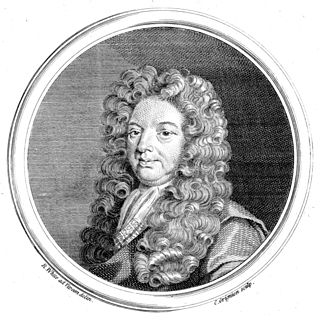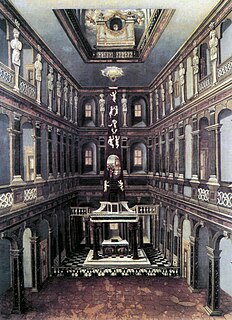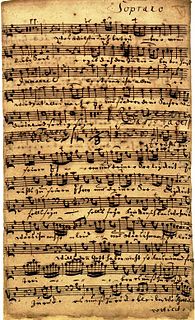Related Research Articles

John Blow was an English Baroque composer and organist, appointed organist of Westminster Abbey in late 1668. His pupils included William Croft, Jeremiah Clarke and Henry Purcell. In 1685 he was named a private musician to James II. His only stage composition, Venus and Adonis, is thought to have influenced Henry Purcell's later opera Dido and Aeneas. In 1687 he became choirmaster at St Paul's Cathedral, where many of his pieces were performed. In 1699 he was appointed to the newly created post of Composer to the Chapel Royal.
"Lift Every Voice and Sing" – often referred to as the Black national anthem – is a song written as a poem by James Weldon Johnson (1871–1938) in 1900 and set to music by his brother John Rosamond Johnson (1873–1954) in 1905.

Johann Sebastian Bach composed the church cantata Mein Herze schwimmt im BlutBWV 199 in Weimar between 1711 and 1714, and performed it on the eleventh Sunday after Trinity, 12 August 1714. It is a solo cantata for soprano.

Edward II is a 1991 British historical tragedy film directed by Derek Jarman and starring Steven Waddington, Tilda Swinton and Andrew Tiernan. It is based on the play of the same name by Christopher Marlowe. The plot revolves around Edward II of England's infatuation with Piers Gaveston, which proves to be the downfall of both of them, thanks to the machinations of Roger Mortimer.
Common metre or common measure—abbreviated as C. M. or CM—is a poetic metre consisting of four lines that alternate between iambic tetrameter and iambic trimeter, with each foot consisting of an unstressed syllable followed by a stressed syllable. The metre is denoted by the syllable count of each line, i.e. 8.6.8.6, 86.86, or 86 86, depending on style, or by its shorthand abbreviation "CM".
Labīd was an Arabian poet.

The Very Best of Simply Red is a two-CD compilation album by Simply Red, originally released in 2003 in Japan.

My Lady Molly is a 'comedy opera' in two acts with a libretto by George H. Jessop, with additional lyrics by Percy Greenbank and Charles H. Taylor, and music by Sidney Jones. The story centers around Lady Molly Martingale, a vivacious young woman, who disguises herself as a man to win the man she loves.

Joshua is an oratorio by George Frideric Handel. It was composed in a month, between 19 July 1747 and 19 August 1747, six months before the beginning of the oratorio season, and is Handel's fourth oratorio based on a libretto by Thomas Morell. The oratorio premiered on 9 March 1748 at the Covent Garden Theatre, London. Joshua is based on the Biblical story of Joshua as the leader of the Children of Israel. The story follows the Israelites from their passage over the Jordan River into Caanan and through the Battle of Jericho. The work also includes a love story elaborated from a few hints in the Biblical narrative between Achsah, Caleb's daughter and Othniel, a young soldier.
"Climb Ev'ry Mountain" is a show tune from the 1959 Rodgers and Hammerstein musical The Sound of Music. It is sung at the close of the first act by the Mother Abbess. It is themed as an inspirational piece, to encourage people to take every step toward attaining their dreams.
Fixed verse forms are a kind of template or formula that poetry can be composed in. The opposite of Fixed verse is Free verse poetry, which by design has little or no pre-established guidelines.

The Starlight Express is a children's play by Violet Pearn, based on the imaginative novel A Prisoner in Fairyland by Algernon Blackwood, with songs and incidental music written by the English composer Sir Edward Elgar in 1915.
Coronation Ode, Op. 44 is a work composed by Edward Elgar for soprano, alto, tenor and bass soloists, chorus and orchestra, with words by A. C. Benson.
"In darkness let me dwell" is a song ascribed to the lutenist and composer John Dowland. Published in 1610, late in Dowland's career, the song shows the influence of Italian music of the early baroque. It was published in A Musical Banquet, a 1610 anthology of songs for lute and voice from England, France, Italy, and Spain compiled by Robert Dowland, John's son. "In darkness let me dwell" has been recorded by many artists, notably by Sting with Edin Karamazov.

This Time it's Love is a 1998 studio album by Kurt Elling.

Johann Sebastian Bach composed the church cantata Was willst du dich betrüben, BWV 107 in Leipzig for the seventh Sunday after Trinity and first performed on 23 July 1724. The chorale cantata is based on the words of Johann Heermann's hymn in seven stanzas "Was willst du dich betrüben" (1630).

Ich lebe, mein Herze, zu deinem Ergötzen, BWV 145, is a five-movement church cantata on a libretto by Picander which Johann Sebastian Bach, as its composer, probably first performed in Leipzig on Easter Tuesday, 19 April 1729. As a seven-movement pasticcio, with one of the added movements composed by Georg Philipp Telemann, it is an Easter cantata known as So du mit deinem Munde bekennest Jesum or as Auf, mein Herz!.

Johann Sebastian Bach composed the church cantata Ach, lieben Christen, seid getrost, BWV 114, in Leipzig for the 17th Sunday after Trinity and first performed it on 1 October 1724.

Fallt mit Danken, fallt mit Loben, BWV 248IV, is a Christmas cantata by Johann Sebastian Bach, composed in 1734 as Part IV of his six-part Christmas Oratorio. Each part of the oratorio is a cantata, written for performance on one of the feast days of the Christmas period. Fallt mit Danken, fallt mit Loben is meant for the New Year's Day feast of the circumcision and naming of Jesus. Based on a libretto by an unknown author, it tells the naming of Jesus from the Nativity of Jesus, according to the Gospel of Luke.